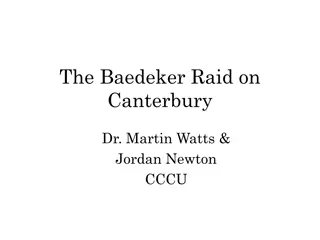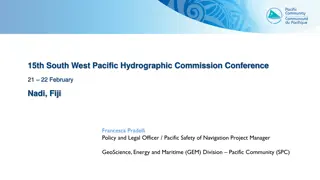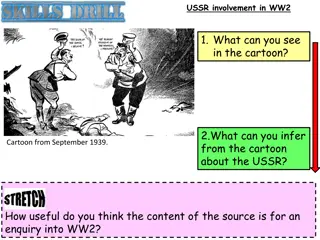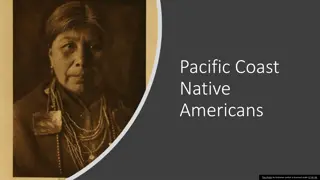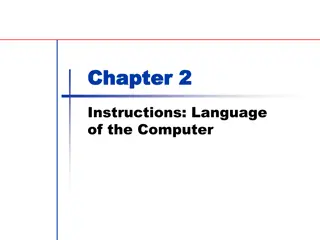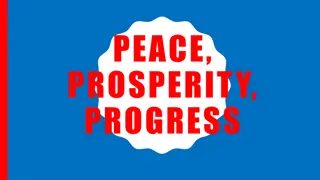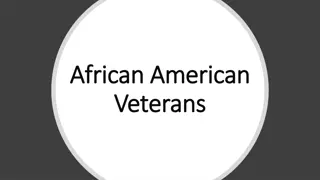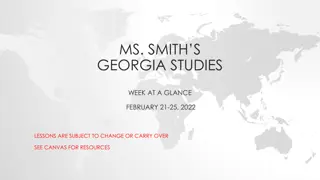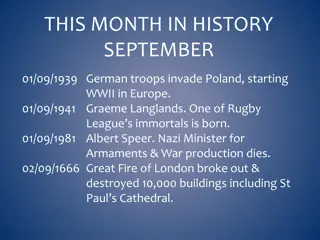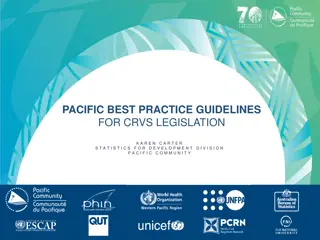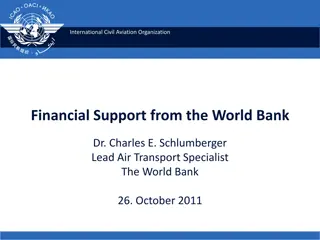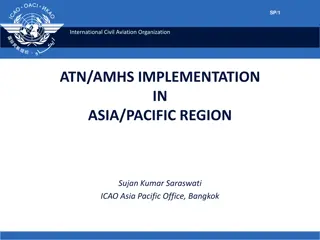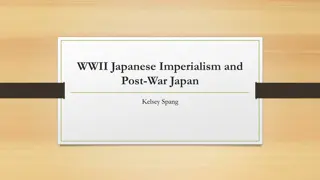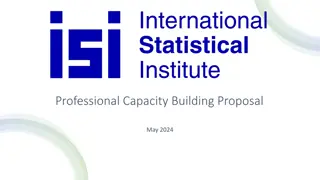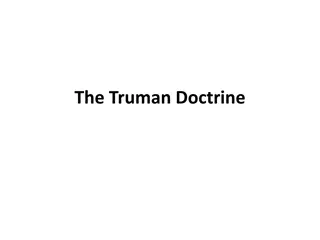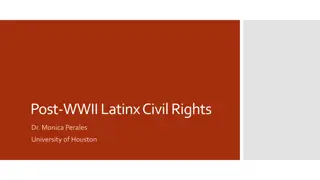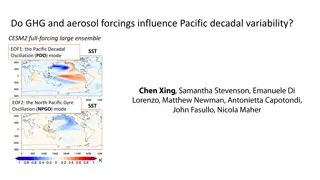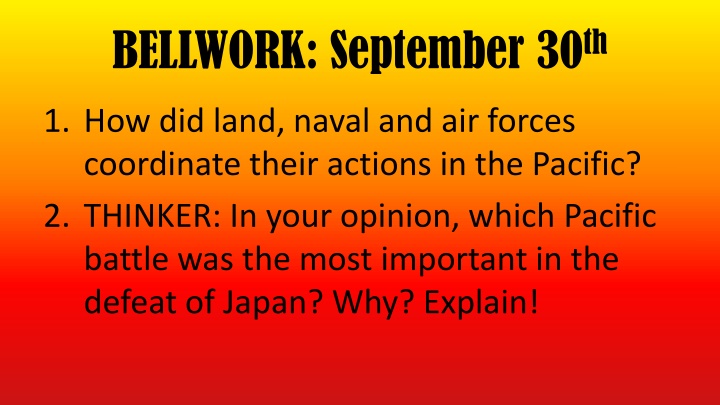
Decisive Battles in the Pacific Theater of World War II
Explore the strategic coordination of land, naval, and air forces in the Pacific theater during World War II, focusing on key battles like Coral Sea and Midway. Delve into the significance of battles like Guadalcanal, Leyte Gulf, Iwo Jima, and Okinawa in the defeat of Japan.
Download Presentation

Please find below an Image/Link to download the presentation.
The content on the website is provided AS IS for your information and personal use only. It may not be sold, licensed, or shared on other websites without obtaining consent from the author. If you encounter any issues during the download, it is possible that the publisher has removed the file from their server.
You are allowed to download the files provided on this website for personal or commercial use, subject to the condition that they are used lawfully. All files are the property of their respective owners.
The content on the website is provided AS IS for your information and personal use only. It may not be sold, licensed, or shared on other websites without obtaining consent from the author.
E N D
Presentation Transcript
BELLWORK: September 30th 1. How did land, naval and air forces coordinate their actions in the Pacific? 2. THINKER: In your opinion, which Pacific battle was the most important in the defeat of Japan? Why? Explain!
Operations in the Pacific War Japan s Refusal to Surrender
Review: Japans Offensives Singapore Wake & Guam Burma Dutch East Indies Philippines
War in the Pacific: Important Battles By early-1942, it became difficult for Japanese to maintain control of vast empire switch to defensive! Low on resources and weapons U.S. codebreakers discovered several planned attacks Once a 2ndfront in Europe is opened (Spring of 1942), American forces concentrated on island hopping: a military strategy of attacking specific enemy-held islands. Battle of the Coral Sea: (5/4/1942) mutual bombing of navies Battle of Midway: (6/4/1942) U.S. wins its first Pacific battle by fighting from the air and destroying the Japanese navy.
US Aircraft Carrier, Lexington, under attack at the Battle of the Coral Sea File:Uss lexington cv2 coral.jpg
Battle of Midway = Turning Point in Pacific! https://www.youtube.com/watch?v=N- au50GxIXw
Allied Offensives: 1943-1945 Battle of Guadalcanal: (2/9/1943) First Japanese-held territory conquered by the U.S. (paved way for 2-pronged offensive) 1944: Maximize navy, improve radar, increase defense Battle of Leyte Gulf (Philippines): (10/23/1944)Greatest naval battle in history; vital to stop oil production. Battle of Iwo Jima: (2/1945): vital to provide support for bombing campaign of mainland; clear victory Battle of Okinawa: (4/11/1945) Last obstacle to an Allied invasion of the Japanese home islands. (played huge role in future tactical decisions ..why?)
U.S. Marines in Guadalcanal; 1942 File:Marines rest in the field on Guadalcanal.jpg https://www.yo utube.com/watc h?v=4VzCTvSQ4J Y&t=67s
Torpedoed Japanese destroyer; Battle of Leyte Gulf File:Torpedoed Japanese destroyer HD-SN-99-02974.JPEG
General MacArthur at Leyte Gulf File:Douglas MacArthur lands Leyte1.jpg https://www.youtube.com/watch?v=q9_fvCKFyQY
http://upload.wikimedia.org/wikipedia/en/thumb/a/a1/WW2_Iwo_Jima_flag_raising.jpg/300px-WW2_Iwo_Jima_flag_raising.jpghttp://upload.wikimedia.org/wikipedia/en/thumb/a/a1/WW2_Iwo_Jima_flag_raising.jpg/300px-WW2_Iwo_Jima_flag_raising.jpg
File:Chinese troops on Stuart tanks Ledo road.jpg Chinese ground forces By this point, they forced Japan out of strongholds and advanced into Burma
American ship, Bunker Hill, after being attacked by Kamikazes Battle of Okinawa File:USS Bunker Hill hit by two Kamikazes.jpg
DISCUSSION THINKER: In your opinion, which Pacific battle was the most important in the defeat of Japan? Why? Explain!
Allied Bombing Campaign By Spring 1945, Japanese home islands were in range of US B- 29 bombers. US Air Force decided to attack at low level with incendiary bombs. Civilian deaths = 300,000 and of country s urban centers were burned to the ground Japanese government still refused to surrender.
HOMEWORK: Due tomorrow! Read about the Manhattan Project! Finish the Manhattan Project portion of the worksheet Be prepared to develop and defend your personal opinion on the atomic bomb!
Bellwork 10/1: Analyze the pros/cons of the atomic bomb. PRO BOMB! ANTI BOMB!
The Manhattan Project A 1941 top secret plan to develop the first atomic bomb. Combination of scientists and physicists Albert Einstein Robert Oppenheimer Presidential approval FDR Truman How it works . https://www.youtube.com/watch?v=E-Ks-Bs0MPM
File:Trinity shot color.jpg Atomic bomb test: Los Alamos, New Mexico July 1945
Trumans decision Truman warned Japanese that if they didn t surrender, they could expect a rain of ruin from the air Enola Gay dropped the first atomic bomb on Hiroshima on August 6, 1945 The second was dropped on Nagasaki on August 9, 1945
Civilian Warning Pre-Hiroshima TO THE JAPANESE PEOPLE: America asks that you take immediate heed of what we say on this leaflet. We are in possession of the most destructive explosive ever devised by man. A single one of our newly developed atomic bombs is actually the equivalent in explosive power to what 2000 of our giant B-29s can carry on a single mission. This awful fact is one for you to ponder and we solemnly assure you it is grimly accurate. We urge that you accept these consequences and begin the work of building a new, better and peace-loving Japan. You should take steps now to cease military resistance. Otherwise, we shall resolutely employ this bomb and all our other superior weapons to promptly and forcefully end the war.
Civilian Warning Pre-Nagasaki ATTENTION JAPANESE PEOPLE. EVACUATE YOUR CITIES. Because your military leaders have rejected the surrender declaration, two momentous events have occurred in the last few days. The Soviet Union, because of this rejection on the part of the military has notified your Ambassador Sato that it has declared war on your nation. Thus, all powerful countries of the world are now at war with you. Also, because of your leaders' refusal to accept the surrender declaration that would enable Japan to honorably end this useless war, we have employed our atomic bomb. A single one of our newly developed atomic bombs is actually the equivalent in explosive power to what 2000 of our giant B-29s could have carried on a single mission. Radio Tokyo has told you that with the first use of this weapon of total destruction, Hiroshima was virtually destroyed. Before we use this bomb again and again to destroy every resource of the military by which they are prolonging this useless war, petition the emperor now to end the war. Our president has outlined for you the thirteen consequences of an honorable surrender. We urge that you accept these consequences and begin the work of building a new, better, and peace-loving Japan. Act at once or we shall resolutely employ this bomb and all our other superior weapons to promptly and forcefully end the war. EVACUATE YOUR CITIES.
Aftermath Ground Temperature 7000F Force Winds 980mph Energy Released 20,000 tons of TNT Buildings Destroyed 62,000 Killed Immediately 80,000 people Dead by end of 1945 140,000 people Total Deaths 220,000 people
Hiroshima File:AtomicEffects-p7a.jpg File:AtomicEffects-p7b.jpg
File:Nagasaki 1945 - Before and after (adjusted).jpg Nagasaki
What do YOU think? Was dropping the atomic bomb the right thing to do? PRO BOMB! ________________________________________________________ ANTI BOMB!
HOMEWORK: due Wednesday! Read and annotate the Effects of WWII in the Pacific Pages 222-225
BELLWORK: 10/2 1. Why was there a decolonization movement post-WWII? 2. Summarize the terms and goals of U.S. occupation of Japan. 3. Why did the U.S. and U.S.S.R emerge as superpowers post-WWII? 4. THINKER: In your opinion, what is the biggest issue the Allies have to deal with post-WWII?
Upcoming dates in IB History. Wednesday 10/2: End & Effects of WWII in Pacific Friday 10/4 (U4 Term Cards!) & Monday 10/7: Propaganda Project Tuesday 10/8: day = current event! Wednesday 10/9 & Friday 10/11: Effects of WWII on Civilians and Crimes against Civilians (video wkst) All late/missing work is due for Q1 grades! Monday 10/21: Finish Crimes against Civilians (Term Card Work) Mrs. Yeager at IB training! Tuesday 10/22 (1/2 day) & Wed 10/23: War Crime Trials Thursday 10/24: WWII Exam (term cards due!)
Surrender Japan surrendered to General Douglas MacArthur on September 2, 1945 "Should We continue to fight, it would not only result in an ultimate collapse and obliteration of the Japanese nation, but also it would lead to the total extinction of human civilization." Emperor Hirohito
Effects of WWII in Asia Japan was eliminated as a major power Allied occupation of Japan (1945-1951) MacArthur appointed Supreme Commander of Allied Powers (SCAP) Removal of Japanese troops in China In 1949, China falls to communism under Mao Zedong Territories are reclaimed: Taiwan, Korea (divided), Pacific Islands USSR gets control of Sakhalin and Kuril Islands The Emperor would help maintain political stability and facilitate reform Japan was turned into a democratic state with a new constitution
Treaty of San Francisco: 9/8/1951 Officially ended Japan s imperial empire Japan accepted judgement of International Military Tribunal Ended American occupation of Japan (improved relations) Compensate Allies, civilians and POW s Japanese compensation to countries occupied during 1941 45 Country Amount in US $ Date of treaty Burma 200,000,000 November 5, 1955 Philippines 550,000,000 May 9, 1956 Indonesia 223,080,000 January 20, 1958 Vietnam 38,000,000 May 13, 1959 Total $1,012,080,000
In accordance with Clause 14 of the Treaty, Allied forces confiscated all assets owned by the Japanese government, firms, organization and private citizens, in all colonized or occupied countries Japanese overseas assets in 1945 Country/region Value (US Dollars) Korea 468,370,000 Taiwan 2,846,100,000 North East China 9,768,800,000 North China 3,695,800,000 Central South China 2,447,900,000 Others 1,867,600,000 Total $25,300,000,000
Review: Superpowers post-WWII Why did the U.S. and U.S.S.R emerge as superpowers post-WWII? Military Reasons US #1 air power & USSR #1 ground forces; FR/UK could not defeat Germany, USSR lacking strong neighbors regional power! Economic Reasons Both economies strengthened by war, US committed to open trade, E.Euro needs a larger/dependable power Political Reasons Both see democracy/communism triumphing over fascism, USSR resisted Germany, Stalin s influence in Europe, USSR/US strength prevented instability in their spheres of influence Areas of tension Post-war control of Poland, Germany, E.Europe and Japan; China, formation of the UN, reparations, atomic bomb, elections
Yalta Conference February 1945 Roosevelt, Churchill, and Stalin met at Yalta (Soviet Union) to discuss the postwar world Formed the United Nations Divided Germany and Berlin into four zones Stalin obtained Poland if he promised to allow free elections Stalin gained Pacific islands if he promised to declare war on Japan
KEEP IN MIND: Stalin is gong to break these promises .. COLD WAR!!!!


